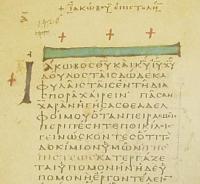"A Transgressor of the Law" -- James 2:1-13
 Wednesday, May 20, 2009 at 01:30PM
Wednesday, May 20, 2009 at 01:30PM  The Fourth in a Series of Sermons on the Epistle of James
The Fourth in a Series of Sermons on the Epistle of James
Christianity is a revolutionary religion which utterly confounds those who do not have faith in Christ. Sinful human nature tells us that good people go to heaven and that bad people go to hell. But Christianity teaches that God justifies the wicked. Sinful human nature tells us that the standard by which we judge people is external: beauty, fame, accomplishments, power, and fortune. But Christianity teaches that God’s standard of judgment is the Ten Commandments.
In the first-century world in which the Epistle of James was written, society was dominated by social castes and wealthy land-owners. But James tells his audience that Christians must show no partiality, either to the rich, or to the poor. Furthermore, James points out how flawed human judgment can be when it comes to matters of sin and salvation. Sinful human nature tells us that people who have more good deeds than bad deeds somehow make it to heaven. But James tells us that God is not going to grade the final exam for eternal life on a curve–God’s passing mark is 100% perfect obedience. In fact, as James will point out, commit but a single sin, and God regards you as a law-breaker, guilty of breaking all of his commandments.
In this sense, Christianity is an utterly revolutionary religion because it completely levels the human playing field. All of us are sinners who deserve to be punished. This is why we have no business judging anyone else. God saves sinners based not upon their merits, but upon the merits of Christ. And once saved by the merits of Christ, all manner of good works spring forth. Non-Christians simply cannot understand this because this is so contrary to sinful human nature.
As we continue our series on the Epistle of James we now make our way into the first thirteen verses of James chapter 2. In this section of his epistle, James takes up a discussion of the evils of discrimination, in particular the way in which wealthy land-owners and merchants throughout Palestine and Syria were exploiting those in James’ audience who were suffering this persecution and hardship because of their loyalty to Christ. Many of those to whom this epistle is addressed–the twelve tribes of the diaspora (persecuted Jewish Christians)–had been cut off from all ties to family, work, and both the temple and the synagogue, because they became followers of Jesus. Evicted from the synagogue and rejected by their families, many joined newly formed house-churches, but were being looked down upon in these assemblies because of their poverty, an important pastoral matter James now addresses head-on.
In many ways, this section of James amounts to the author fleshing out several of the comments he made at the end of the first chapter. In verse 22, James exhorted his audience to “be doers of the word, and not hearers only, deceiving yourselves.” In verse 27, James spoke of the need to show compassion to the poor. “Religion that is pure and undefiled before God, the Father, is this: to visit orphans and widows in their affliction, and to keep oneself unstained from the world.” Therefore, the theme of this next section of James–a theme to which James will return in chapter five–is that discrimination against the poor is a violation of the law of God. In fact, based upon what James has said in chapter one about those who hear the word but do not do the word, it is not a stretch to conclude that those who use worldly standards to judge each other in self-righteousness are actually self-deceived. The standard of measurement which counts is not someone’s opinion, or their sinful prejudices. The standard of measurement that God uses is his law. And when we are measured against that standard, all of us quickly realize that we are sinners.
To read the rest of this sermon, click here


Reader Comments